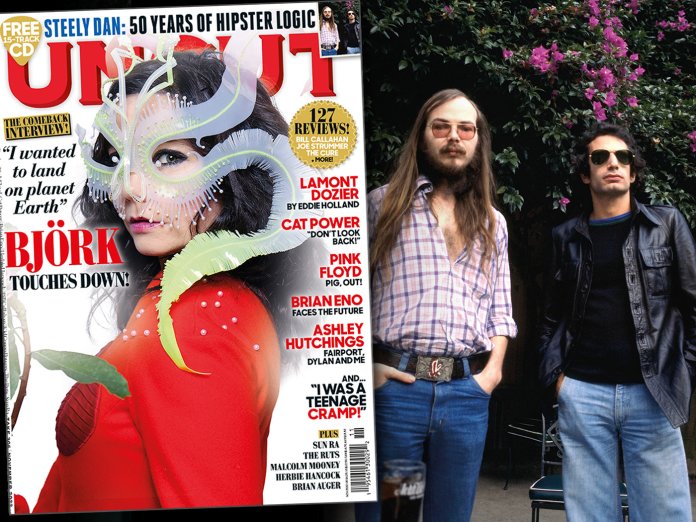Fifty years ago, Can’t Buy A Thrill introduced STEELY DAN’s impeccable brand of hipster logic – and the whip-smart songwriting partnership of Donald Fagen and Walter Becker. To celebrate, Uncut has assembled a cast of Dan aficionados – including DAVID CROSBY, ST VINCENT, PADDY McALOON, AIMEE MANN, BRUCE HORNSBY, JOAN WASSER and LLOYD COLE – to explore the band’s original run of unimpeachable studio albums. “They’re the American Beatles,” learns Graeme Thomson, in the latest issue of Uncut magazine – in UK shops from Thursday, Sept 15 and available to buy from our online store.
It is 50 years since the world heard the first bittersweet flowerings of one of music’s most innovative, ambitious and unique pairings. Donald Fagen and Walter Becker first met in 1967 as like-minded students at Bard College, a private liberal arts college in upstate New York. Naming their high-concept band after a steam-powered dildo from William Burroughs’ Naked Lunch, in 1971 they relocated from NYC to LA to work as staff songwriters at ABC and never looked back.
Assisted by producer Gary Katz, jettisoning original band members and performing live in favour of assembling a studio-orientated squad of the greatest session men and women money could buy, between 1972 and 1980 Steely Dan embarked upon one of the hottest – and coolest – creative streaks in music.
From the avant-boogie group aesthetic of Can’t Buy A Thrill, where David Palmer shared lead vocals, they evolved to the far-reaching vistas of Aja, rich with melody, crafted solos and layered musical movements. By Gaucho (1980), painstaking attention to sonic detail and increasingly hedonistic lifestyles inched Steely Dan towards the pursuit of an almost neurotic sonic perfectionism. Yet an unmistakable creative sensibility was evident from the start: consummate musicianship, killer grooves, rhythmic joy, memorable tunes, wry humour and stellar guests, topped off with Fagen’s cryptic, hyper-literate, reliably unreliable narration, doused in sardonic romanticism.
“They’re the American Beatles because they coined a musical genre that hadn’t existed before,” says Aimee Mann, one of the eclectic cast of admirers Uncut has invited to celebrate the band’s body of work. “Yes, it’s sort of a mixture of rock and jazz, but the way in which those two elements were combined was completely unique to them. To have the musical facility to put beautiful melodies on top of unlikely chord changes, with such well-written lyrics about really broken, sad subjects, and to create a whole new sound with a really idiosyncratic vocal – that’s the whole package! They invented a new thing.”
1. CAN’T BUY A THRILL
(ABC, 1972)
The work of a functioning touring band: post-boogie subversion and rhythmically audacious hits with three lead vocals by David Palmer
DAVID CROSBY: Steely Dan are my favourite band. They have been forever and still are. The first song I heard was “Reelin’ In The Years”. Nobody else was doing that. I could hear it right away. They wrote better, they sang better, they played better, they didn’t limit themselves. They did it first and they did it best.
JOE JACKSON: “Do It Again” is the first track on the first album, and right away it’s Steely Dan. It’s quite unusual, this Latin groove and electric sitar on the solo. You think the vocal is going to come back in – but no, there’s another solo on the organ! It’s unique. The fact that it was a hit still amazes me.
ANNIE CLARK, ST VINCENT: This is [an album] I’d listen to on car trips. It’s so melodic, memorable and well written, but there’s also solos on every song. There’s such intense,
ear-opening harmony.
AIMEE MANN: “Brooklyn” is a huge favourite. I was supposed to support Steely Dan this year but there was some confusion, layers of management stuff, and it never happened. On Twitter I wrote that all is forgiven if Donald Fagen will tell me what “Brooklyn” is about. I got this email from him! He wrote a long story about when they were living in Brooklyn and first writing songs, and dreaming about getting a really great band, and what will that sound like? “Brooklyn” was about his downstairs neighbour; this loudmouthed, entitled guy. From a cynical viewpoint, they listed all these prizes they felt like this guy thought he was entitled to; what would it take to make this asshole happy? But on some level you can tell they’re also talking about themselves: “What are the riches and prizes that I maybe don’t feel entitled to, but would like to feel entitled to?” There’s this one chord change that goes to the minor that’s really heartbreaking. It sounds like a break in the mask. That’s what makes them so interesting: the damage that you can hear underneath the cynicism.
PICK UP THE NEW ISSUE OF UNCUT TO READ THE FULL STORY


